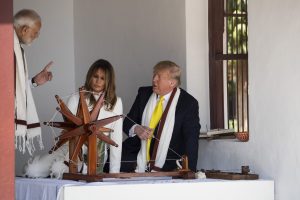In recent years, the birth and death anniversaries of Mahatma Gandhi have been dominated by commentary on how the late Indian freedom fighter’s reputation is starkly different inside and outside India. This year has brought more of the same.
After the G-20 Summit in New Delhi this year, Prime Minister Narendra Modi took world leaders to Gandhi’s memorial at Rajghat where they paid homage amid rain. Days later, on the occasion of Gandhi’s birth anniversary on October 2, Modi hailed his “timeless teachings” for mankind.
Yet, all this reverence sits uneasily with the fact that Modi’s party, the Hindu nationalist Bharatiya Janata Party (BJP), is at the vanguard of a movement that denounces Gandhi’s secularism and yearns to remake his nation.
For years, the BJP has been renaming streets, structures and government schemes after Hindu nationalist leaders, many of whom were Gandhi’s ideological opponents during his lifetime. That list of leaders includes the Hindu nationalist ideologue, Vinayak Damodar Savarkar, who was once a mentor to Gandhi’s assassin, Nathuram Godse.
Meanwhile, several of the BJP’s leaders have been caught uncomfortably straddling the ideological divide between Gandhi and his Hindu nationalist assassin. At times, the contrast is jarring. On Gandhi’s birth anniversary this year, Modi’s homage was echoed by Uttar Pradesh Chief Minister Yogi Adityanath, who paid a public tribute to Gandhi. Yet, one of the organizations founded by Adityanath, the Hindu Yuva Vahini, has previously celebrated Godse in glowing terms. Multiple BJP MPs have also expressed similar sentiments.
Hindu nationalists have long resented Gandhi because they believe that he pioneered the appeasement of religious minorities. Gandhi had adhered to an uncompromising line of religious tolerance amidst the communal passions that had dominated the Partition of India. That narrative later shaped India’s Constitution in 1950, which demarcated several provisions to protect the rights of religious minorities.
By contrast, Hindu nationalists seek an Indian identity based less on the universal principles championed by Gandhi – of secularism, liberty, and egalitarianism – and more on the notion that India belongs primarily to the Hindus. In 2019, Modi’s government introduced a controversial Citizenship Amendment Act that sought to fast-track citizenship for non-Muslim refugees from across South Asia. That law was premised on the BJP’s stated belief that India is a “natural home for persecuted Hindus.”
But the problem for Modi is that the BJP’s Hindu nationalism has a soft power crisis abroad, and if India were to define itself as a Hindu nation on the world stage, it would struggle to replicate Gandhi’s universal appeal.
For decades, Gandhi and his secular, non-violent freedom struggle have been invoked as an inspiration by civil rights movements all over the world. In South Africa, Nelson Mandela frequently spoke of Gandhi’s example during his fight against Apartheid. When Martin Luther King Jr visited India in 1959, he said that he was coming as a “pilgrim” to the “Land of Gandhi”. Even during the more recent protests of the Arab Spring, Gandhi had served as a mobilizing symbol.
That soft power derives from the fact that Gandhi had based his movement, not on narrow religious or ethnic nationalism, but on universal principles to which people everywhere could relate. Gandhi’s message of tolerance, non-violence, and communal harmony has enjoyed lasting appeal specifically because it could be applied just as easily to Egypt or Ethiopia as it could to India. By contrast, given that Hindu nationalism is focused more narrowly on Hindu religious identity, no Hindu nationalist leader has ever been invoked positively by any movement outside India.
To address this discrepancy, the BJP has continued to embrace Gandhi in its global diplomatic outreach, even as it has touted his ideological rivals at home. But this might soon prove unsustainable. Hindu nationalism essentially seeks a revision of Gandhi’s conception of India, and under Modi, the BJP has emboldened factions that would like to see New Delhi dispense of the Mahatma and his message more explicitly.
Perhaps just as importantly, if New Delhi seeks to continue down the path towards Hindu nationalism, Gandhi himself would likely never have acquiesced to becoming a mascot for that effort.

































